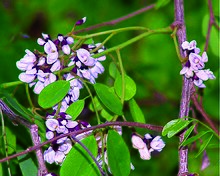Dalbergieae
Appearance
(Redirected from Aeschynomeneae)
| Dalbergieae | |
|---|---|

| |
| Dalbergia lanceolaria | |
| Scientific classification | |
| Kingdom: | Plantae |
| Clade: | Tracheophytes |
| Clade: | Angiosperms |
| Clade: | Eudicots |
| Clade: | Rosids |
| Order: | Fabales |
| Family: | Fabaceae |
| Subfamily: | Faboideae |
| Clade: | Meso-Papilionoideae |
| Clade: | Dalbergioids |
| Tribe: | Dalbergieae (DC.) Cardoso et al. 2013[1] |
| Type genus | |
| Dalbergia L. f.
| |
| Subclades and genera | |
|
See text | |
| Synonyms[2] | |
| |
The tribe Dalbergieae is an early-branching clade within the flowering plant subfamily Faboideae (or Papilionaceae). Within that subfamily, it belongs to an unranked clade called the dalbergioids.[1][3][4] It was recently revised to include many genera formerly placed in tribes Adesmieae and Aeschynomeneae[5] and to be included in a monophyletic group informally known as the dalbergioids sensu lato.[1][3][4] The members of this tribe have a distinctive root nodule morphology, often referred to as an "aeschynomenoid" or "dalbergioid" nodule.[1][5]
Subclades and genera
[edit]Adesmia clade
[edit]Dalbergia clade
[edit]- Aeschynomene L.
- Bryaspis P. A. Duvign.
- Cyclocarpa Afzel. ex Urb.
- Dalbergia L. f.
- Diphysa Jacq.
- Geissaspis Wight & Arn.
- Humularia P. A. Duvign.
- Kotschya Endl.
- Machaerium Pers.
- Ormocarpopsis R. Vig.
- Ormocarpum P. Beauv.
- Pictetia DC.
- Smithia Aiton
- Soemmeringia Mart.
- Steinbachiella Harms.[8]
- Weberbauerella Ulbr.
- Zygocarpum Thulin & Lavin[9]
Pterocarpus clade
[edit]- Acosmium Schott[10]
- Arachis L.
- Brya P. Browne
- Cascaronia Griseb.
- Centrolobium Mart. ex Benth.
- Chapmannia Torr. & A. Gray
- Cranocarpus Benth.
- Discolobium Benth.
- Etaballia Benth.
- Fiebrigiella Harms
- Fissicalyx Benth.
- Geoffroea Jacq.
- Grazielodendron H. C. Lima
- Inocarpus J. R. Forst. & G. Forst.
- Maraniona C.E.Hughes, G.P.Lewis, Daza, & Reynel[11]
- Paramachaerium Ducke[12]
- Platymiscium Vogel
- Platypodium Vogel
- Pterocarpus Jacq.
- Ramorinoa Speg.
- Riedeliella Harms
- Stylosanthes Sw.
- Tipuana (Benth.) Benth.
References
[edit]- ^ a b c d Cardoso D; Pennington RT; de Queiroz LP; Boatwright JS; Van Wyk B-E; Wojciechowskie MF; Lavin M (2013). "Reconstructing the deep-branching relationships of the papilionoid legumes". S Afr J Bot. 89: 58–75. doi:10.1016/j.sajb.2013.05.001. hdl:10566/3193.
- ^ Klitgaard BB; Lavin M (2005). "Tribe Dalbergieae sens. lat". In Lewis G; Schrire B; Mackinder B; Lock M (eds.). Legumes of the World. Royal Botanic Gardens, Kew. pp. 307–335. ISBN 978-1900347808. Archived from the original on 2014-02-02. Retrieved 2014-07-21.
- ^ a b Cardoso D; de Queiroz LP; Pennington RT; de Lima HC; Fonty É; Wojciechowski MF; Lavin M (2012). "Revisiting the phylogeny of papilionoid legumes: new insights from comprehensively sampled early-branching lineages". Am J Bot. 99 (12): 1991–2013. doi:10.3732/ajb.1200380. PMID 23221500.
- ^ a b Wojciechowski M.F. (2013). "Towards a new classification of Leguminosae: Naming clades using non-Linnaean phylogenetic nomenclature". S Afr J Bot. 89: 85–93. doi:10.1016/j.sajb.2013.06.017.
- ^ a b Lavin M; Pennington RT; Klitgaard BB; Sprent JI; de Lima HC; Gasson PE (2001). "The dalbergioid legumes (Fabaceae): delimitation of a pantropical monophyletic clade". Am J Bot. 88 (3): 503–33. doi:10.2307/2657116. JSTOR 2657116. PMID 11250829.
- ^ Fortuna-Perez AP, Marinho CR, Vatanparast M, Vargas W, Iganci JRV, Lewis GP, Candido ES, Moura TM, Monteiro TC, Miotto STS, Teixeira SP (2021). "Secretory structures of the Adesmia clade (Leguminosae): Implications for evolutionary adaptation in dry environments". Perspectives in Plant Ecology, Evolution and Systematics. 48: 125588.
- ^ Fortuna-Perez AP, Silva MJ, Queiroz L, Lewis GP, Simoes AO, Tozzi A, Sarkinen T, Souza AP (2013). "Phylogeny and biogeography of the genus Zornia (Leguminosae: Papilionoideae: Dalbergieae)". Taxon. 62 (4): 723–32. doi:10.12705/624.35.
- ^ Lewis GP; Wood JRI; Lavin M (2012). "Steinbachiella (Leguminosae: Papilionoideae: Dalbergieae), endemic to Bolivia, is reinstated as an accepted genus". Kew Bull. 67 (4): 789–796. Bibcode:2012KewBu..67..789L. doi:10.1007/s12225-012-9415-z.
- ^ Thulin M; Lavin M. (2001). "Phylogeny and Biogeography of the Ormocarpum Group (Fabaceae): A New Genus Zygocarpum from the Horn of Africa Region". Syst Bot. 26 (2): 299–317. JSTOR 2666709.
- ^ Cardoso D; de Lima HC; Rodrigues RS; de Queiroz LP; Pennington RT; Lavin M (2012). "The realignment of Acosmium sensu stricto with the Dalbergioid clade (Leguminosae: Papilionoideae) reveals a proneness for independent evolution of radial floral symmetry among early-branching papilionoid legumes". Taxon. 61 (5): 1057–1073. doi:10.1002/tax.615011.
- ^ Hughes CE; Lewis GP; Daza Yomona A; Reynel C (2004). "Maraniona. A New Dalbergioid Legume Genus (Leguminosae, Papilionoideae) from Peru". Syst Bot. 29 (2): 366–374. doi:10.1600/036364404774195557.
- ^ Cardoso D; São-Mateus WMB; da Cruz DT; Zartman CE; Komura DL; Kite G; Prenner G; Wieringa JJ; Clark A; Lewis G; Pennington RT; de Queiroz LP (2015). "Filling in the gaps of the papilionoid legume phylogeny: The enigmatic Amazonian genus Petaladenium is a new branch of the early-diverging Amburaneae clade". Mol Phylogenet Evol. 84: 112–124. Bibcode:2015MolPE..84..112C. doi:10.1016/j.ympev.2014.12.015. PMID 25575702.
External links
[edit] Media related to Dalbergieae at Wikimedia Commons
Media related to Dalbergieae at Wikimedia Commons Data related to Dalbergieae at Wikispecies
Data related to Dalbergieae at Wikispecies
